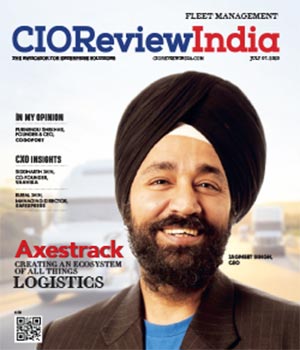
Fleet Management - Optimization of Costs, Risks and Efficiency in Operations
Navdeep Singh Ahluwalia, Head –Network & Information Security, Dalmia Cement Bharat | Wednesday, 19 July 2017, 10:50 IST
 Fleet management basically constitutes management of Commercial motor vehicles, specialist vehicles, trailers and the grey fleet – private vehicles used for work.
Fleet management basically constitutes management of Commercial motor vehicles, specialist vehicles, trailers and the grey fleet – private vehicles used for work.
This includes a range of functions - vehicle financing, maintenance, tracking and diagnostics, management of drivers, speed, fuel, health and safety.
Fleet Management helps companies to remove and minimize the risks associated with purchasing and maintenance of vehicles. It also helps organizations in increasing the efficiency and productivity thus reduction in transportation and staff costs and also being compliant to audit and government norms. To manage these, organizations can either have an in-house dedicated department or it can also be outsourced. The outsourcing model has gained pace in last 5 years and the number of fleet management providers has increased by 50% in last one decade.
Professional fleet management includes many diverse tasks and responsibilities. A dedicated team is required to manage vehicle acquisition, maintenance, repairs and disposal by following all laws, regulations and policies. It should address all long-range strategic and business aspects of owning, operating and disposing of vehicles.
A fleet management system is designed to track, analyze and provide necessary reports to ensure accurate and timely decision-making. Captured database can help in inventory maintenance, identification and analysis of high-cost vehicles, generation of regulatory compliance reports and vehicle replacement time periods.
The basic functionality of fleet management systems is tracking of vehicle which is done using GPS system. Parameters covered in GPS are vehicle location, direction and speed. Data transmission of these parameters includes both terrestrial and satellite. Satellite tracking is expensive as compared to terrestrial tracking but is critical if tracking is to be done in remote environments without interruption. Real-time visibility of the fleet related to location, status can be seen on the MAP and is used for a quick response and diagnostics to events on the field.
Activity reports and alerts can be generated and shared with respective stakeholders for running an efficient fleet.GPS tracking drastically reduces the number of thefts and loss to organization caused by stolen vehicles.GPS devices are powered by the vehicle engines and are able to detect low battery and engine idling behavior of drivers when stationary. It also detects unsafe driving behaviors (speeding, hard braking or going off-route) and also notifies the drivers that their driving behaviors are being tracked by GPS technology.
Some of the key features of Fleet Management system are -
• Alarms and warning related to speed and inappropriate disposal of material.
• Proximity detection in the underground
• Automatic data capture and transfer reducing manual entry and human errors
• Task allocation and real-time tracking of task
Some of the Key Benefits of Fleet Management system are -
• Reduction in Costs and Increase in Production.
• Control and manageability of thefleet in regards to safety and awareness related to accuracy and tracking of fleet targets.
• Visualization of underground and surface fleets.
• Organizations are relying on fleet managers to control costs, maximize profitability, and mitigate risks of their fleet vehicles.
To summarize fleet management is the optimization of costs, risks and efficiency in operations.
CIO Viewpoint
Adoption Of New Technology Trends In The...
By Vinod Raju, Head IT & Enterprise Applications, EFL (Expo Freight)
Vehicle Tracking Bringing Transparency In...
By Biren Parikh, CIO, CERA Sanitaryware Ltd
B2B Integration Key to Supply Chain Excellence
By Dan Sellers, CIO, WSI
CXO Insights
Kroks Technologies LLP Delivering Tracking,...
By Ashith Kunder and Ashwin Kunder, Co-Founders
Technology Pushing Cost Savings in Logistics
By E.R. Williams, Co-Founder & Technology Lead, Zipline Logistics
Technology: Building a Competitive Advantage in...








